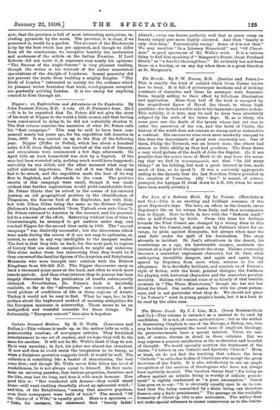The Nicene Creed. By J. J. Lias, MA. (Swan Sonnenschein
and Co.)—This volume is intended as a manual to be used by candidates. It is not, of course, authoritative ; but as the author is Examining Chaplain to one of the Bishops, a Bishop, too, who may be taken to represent the usual tone of Anglican theology, its pronouncements have a special interest. These we can- not, of course, discuss in detail in these columns. But we may express a general satisfaction at the moderation and breadth of thought. We would specially mention the treatment of the clause, "I believe in one Catholic and Apostolic Church." Here, at least, we do not find the teaching that refuses the term ' Catholic " to orthodox bodies of Christians who accept the great doctrines of the Faith. It is also satisfactory to see an ample recognition of the services of theologians who have not always been equitably treated. The baseless theory that" Sin being an offence against an infinite Being is worthy of infinite punish- ment " is rightly condemned as "a pure assumption." Canon Liao goes on to Bay: "It is obviously equally open to us to con- tend that Sin, being committed by a finite being, can therefore deserve only a finite punishment." The passage on the veritable humanity of Christ (p. 158) is also noticeable. The author does not make special reference to recent controversy as to the limits-
tions of Christ's knowledge, but it is not difficult to see what view he would take. The volume puts a great amount of sound theology into a small compass.







































 Previous page
Previous page